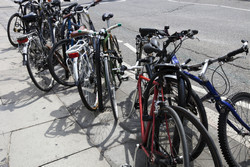Why transferring sustainable transport ideas is a winning concept
The EU-funded TIDE project, which aims to introduce cities to new sustainable transport technologies, recently won the 2015 European Platform on Mobility Management Award for best international policy transfer. Special recognition was given to the towns of Groningen, the Netherlands and Donostia/San Sebastian, Spain for their cooperation in promoting parking for cyclists. While Donostia/San Sebastian has a growing cycling culture, the city has suffered for years from a lack of parking infrastructure. Residents have been forced to leave their bikes on the street, generating clutter and reducing space in the tightly congested old town. The TIDE (Transport innovation deployment for Europe) project was able to identify Groningen as an example of good practice in this respect, and set about arranging a transfer of ideas. Meetings between the two towns were organised, with city officials from Donostia/San Sebastian visiting Groningen and participating in training sessions. This is one example of how the three-year project, due for completion in September 2015, has helped to transform urban transport through the sharing of best practices and technologies. The project began in 2012 by selecting mobility concepts deemed most promising, and then set about developing and publishing implementation guidelines and a transferability methodology. The project then issued an open call for proposals, which led to the selection of 10 cities interested in developing some of these innovations. TIDE researchers advised the cities about costs and benefits as well as impact issues. Roadmaps for these cities have now been prepared, while 50 more cities will receive training in the use of TIDE methodologies. Reading in the UK is TIDE project’s leading city when it comes to advanced network and traffic management to support traveller information. Reading Borough Council launched a two-week challenge to find app developers interested in creating travel apps that would allow people living in and around the borough to get instant travel and transport information on their phones. The winning entry was a local team who came up with a concept that provides information tailored to individual needs and interests. In order to ensure that TIDE achieves a sustainable impact long after it is completed, an innovation toolbox containing 15 transport measures has been developed. The project consortium hopes that local authorities and urban transport professionals will continue to access the toolbox and think seriously about adopting sustainable transport technologies. The toolbox is organised into five themes: financial models, non-motorised transportation, network management, electric vehicles and public transportation organisation. The project has also refined existing transfer methodologies and integrated them into a handbook. The TIDE consortium consists of 14 partners from nine countries. Moreover, through the member cities and regions of two partner organisations – Polis and EUROCITIES – the project has been able to cover not only the EU but also several accession and neighbouring countries as well. Each partner is an expert or leader in innovative urban mobility policy. For further information please visit: TIDE http://www.tide-innovation.eu/en/
Countries
Belgium



